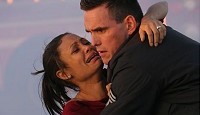
 MUST-SEE
MUST-SEE
scr Paul Haggis, Bobby Moresco
with Sandra Bullock, Don Cheadle, Matt Dillon, Jennifer Esposito, Brendan Fraser, Terrence Howard, Thandie Newton, Ryan Phillippe, Chris 'Ludacris' Bridges, Larenz Tate, Michael Peña, Nona Gaye, Shaun Toub, Bahar Soomekh, Marina Sirtis, Loretta Devine, Yomi Perry, William Fichtner, Keith David, Tony Danza
release US 6.May.05, UK 12.Aug.05
Lions Gate 04/US 1h40

Tense encounter No 2: Newton and Dillon






 • TOP 10 FILM • SUPPORTING ACTOR Matt Dillon • READER CHOICE: SUPPORTING ACTOR Matt Dillon |
 With its large ensemble cast, L.A. setting, intertwined narrative strands and heavily emotional tone, this film feels perhaps a bit too much like Magnolia for its own good. But it's a solid film about seriously important issues.
With its large ensemble cast, L.A. setting, intertwined narrative strands and heavily emotional tone, this film feels perhaps a bit too much like Magnolia for its own good. But it's a solid film about seriously important issues.
All of the plot threads deal with racial issues: A District Attorney and his paranoid wife (Fraser and Bullock) are carjacked by two black teens (Bridges and Tate). A pair of very different cops (Dillon and Phillippe) surprise themselves during tense situations. A wealthy couple (Newton and Howard) endure a horrible incident, then have their worldview challenged even further. Two detectives (Cheadle and Esposito) find their interracial relationship strained to the breaking point. A Latino locksmith (Peña) copes with slurs and a terrifying assault. And a Middle Eastern family (Toub, Soomekh and Sirtis) feels oppressed by everyone around them.
This film can't help but get under our skin, thanks to extremely strong production values and transparent, raw performances from the entire cast. Director-cowriter Haggis (Million Dollar Baby) tackles the race issue from just about every conceivable angle; each scene snaps with life and energy, tapping into the emotions and highlighting the issues in extremely insightful ways. It's impossible to pick a standout cast member--they're all astonishing. But the strongest scenes are the two shocking encounters between Newton and Dillon. While Peña has perhaps the film's most engaging and involving character.
This is clearly meant to be provocative and challenging, wrestling with difficult issues and approaching the themes from all kinds of angles. The script keeps things nicely grounded in honest reality, avoiding obvious flashpoints for something much more meaningful and resonant. But this means that it's also extremely over-constructed, relying heavily on coincidence and emotional manipulation. Essentially, it's an examination of the symptoms, never touching on causes or solutions. And it gets increasingly heavy and pessimistic as it goes. But the film is so well shot and edited, with such complex dialog and acting, that it still has the power to change the way we see the world.
 |
themes, language, violence | 7.Apr.05 |

 Lynne Roberts, Aberdeen:
Lynne Roberts, Aberdeen:  "I didn't have high expectations for this film, having read mixed reviews. I set myself up for an experience not too deep or challenging but hopefully better than the usual Hollywood fodder. The film surpassed those minimal expectations and continues to linger in my mind several days later. This surprises me because if one was to take the various aspects of racism that the film tackles, in isolation, nothing new is being said. However, what lifts the film from mediocrity and contrivances is the fact that causes and cures are not tackled, leaving the viewer space for their own internal debates. One is left with all sorts of ideas to mull over - the roots of prejudice and how we form our identity. We think we know ourselves until unconsciously absorbed attitudes surprise us in reflex actions, often with life-changing consequence. I would recommend this film, rate it as better than average, the sum of the whole being greater than the sum of the parts." (28.Aug.05)
"I didn't have high expectations for this film, having read mixed reviews. I set myself up for an experience not too deep or challenging but hopefully better than the usual Hollywood fodder. The film surpassed those minimal expectations and continues to linger in my mind several days later. This surprises me because if one was to take the various aspects of racism that the film tackles, in isolation, nothing new is being said. However, what lifts the film from mediocrity and contrivances is the fact that causes and cures are not tackled, leaving the viewer space for their own internal debates. One is left with all sorts of ideas to mull over - the roots of prejudice and how we form our identity. We think we know ourselves until unconsciously absorbed attitudes surprise us in reflex actions, often with life-changing consequence. I would recommend this film, rate it as better than average, the sum of the whole being greater than the sum of the parts." (28.Aug.05)
HOME | REVIEWS | NEWS | FESTIVAL | AWARDS | Q&A | ABOUT | TALKBACK